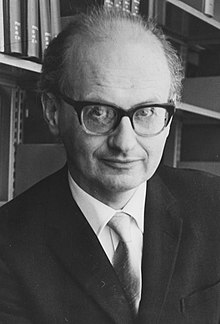Imre Lakatos
| Imre Lakatos | |
|---|---|

Imre Lakatos, c. 1960s
|
|
| Born |
November 9, 1922 Debrecen, Hungary |
| Died | February 2, 1974 (aged 51) London, England |
| Alma mater |
University of Debrecen Moscow State University University of Cambridge |
| Era | 20th-century philosophy |
| Region | Western Philosophy |
| School |
Historical turn Fallibilism Falsificationism |
|
Main interests
|
Philosophy of mathematics, philosophy of science, epistemology, politics |
|
Notable ideas
|
Method of proofs and refutations, methodology of scientific research programmes, methodology of historiographical research programmes, positive vs. negative heuristics, progressive vs. degenerative research programmes, criticism of logical positivism and formalism |
|
Influenced
|
|
Imre Lakatos (Hungarian: Lakatos Imre [ˈlɒkɒtoʃ ˈimrɛ]; November 9, 1922 – February 2, 1974) was a Hungarian philosopher of mathematics and science, known for his thesis of the fallibility of mathematics and its 'methodology of proofs and refutations' in its pre-axiomatic stages of development, and also for introducing the concept of the 'research programme' in his methodology of scientific research programmes.
Lakatos was born Imre (Avrum) Lipschitz to a Jewish family in Debrecen, Hungary in 1922. He received a degree in mathematics, physics, and philosophy from the University of Debrecen in 1944. In March 1944 the Germans invaded Hungary and Lakatos along with Éva Révész, his then-girlfriend and subsequent wife, formed soon after that event a Marxist resistance group. In May of that year, the group was joined by Éva Izsák, a 19-year-old Jewish antifascist activist. Lakatos, considering that there was a risk that she would be captured and forced to betray them, decided that her duty to the group was to commit suicide. Subsequently, a member of the group took her to Debrecen and gave her cyanide.
During the occupation, Lakatos avoided Nazi persecution of Jews by changing his name to Imre Molnár. His mother and grandmother died in Auschwitz. He changed his surname once again to Lakatos (Locksmith) in honor of Géza Lakatos.
...
Wikipedia
